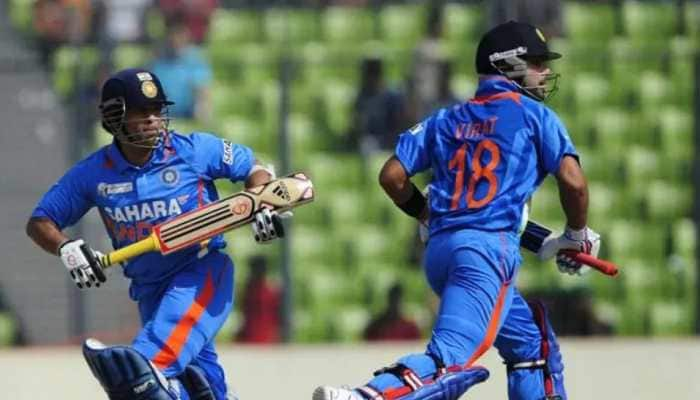North Korea conducts ballistic missile test; 'will take care of it', says Donald Trump
Some scientists have warned that Washington DC could now theoretically be within the range of Pyongyang`s weapons.
- North Korea on Wednesday conducted ICBM test.`
- The test comes a week after the US put North Korea on list of countries supporting terrorism
- The experts have warned that the US could now be under N Korea's range
Trending Photos
) Representational image
Representational image Seoul/Washington: North Korea fired what appeared to be an intercontinental ballistic missile (ICBM) that landed close to Japan, with some scientists cautioning that Washington, DC could now theoretically be within the range of Pyongyang`s weapons.
North Korea fired the missile, its first launch since mid-September, a week after US President Donald Trump put North Korea back on a US list of countries it says support terrorism.
The designation allows the United States to impose more sanctions, although some experts said it risked inflaming tensions on the Korean Peninsula.
North Korea has conducted dozens of ballistic missile tests under its leader, Kim Jong Un, in defiance of UN sanctions. Trump has vowed not to let North Korea develop nuclear missiles that can hit the mainland United States.
The South Korean military said the missile, fired on a steep trajectory, reached an altitude of around 4,500 km (2,800 miles) and flew 960 km (600 miles) before landing in Japan`s exclusive economic zone.
“It went higher frankly than any previous shot they’ve taken, a research and development effort on their part to continue building ballistic missiles that can threaten everywhere in the world, basically," US Defense Secretary Jim Mattis told reporters at the White House.
Trump and Japanese Prime Minister Shinzo Abe spoke by phone and agreed to boost deterrence capability against North Korea, Yasutoshi Nishimura, deputy chief cabinet secretary, told reporters in Tokyo.
"It is a situation that we will handle," Trump told reporters at the White House, speaking about the latest test.
Trump, who was briefed on the missile while it was in flight, said it did not change his administration`s approach to North Korea, which has included new curbs to hurt trade between China and North Korea.
All Options
Washington has said repeatedly that all options, including military ones, are on the table in dealing with North Korea, but that it prefers a peaceful solution by Pyongyang agreeing to give up its weapons programs.
"Diplomatic options remain viable and open, for now," US Secretary of State Rex Tillerson said.
"The United States remains committed to finding a peaceful path to denuclearization and to ending belligerent actions by North Korea."
Other than carrying out existing U.N. sanctions, "the international community must take additional measures to enhance maritime security, including the right to interdict maritime traffic" travelling to North Korea, Tillerson said in a statement.
The UN Security Council was scheduled to meet on Wednesday to discuss North Korea`s latest missile launch. North Korea has given no indication it is willing to give up its weapons programs and re-enter diplomatic talks.
The Pentagon said its initial assessment was that an ICBM was launched from Sain Ni in North Korea and travelled about 1,000 km (620 miles) before splashing down in the Sea of Japan. The missile did not pose a threat to the United States, its territories or allies, the Pentagon said.
US East Coast In Range?
Japanese officials said the missile flew for 53 minutes and broke up before landing in Japan`s exclusive economic zone. Defence Minister Itsunori Onodera said it was judged to be ICBM class given its lofted trajectory.
"If these numbers are correct, then if flown on a standard trajectory rather than this lofted trajectory, this missile would have a range of more than 13,000 km (8,100 miles) ... Such a missile would have more than enough range to reach Washington, D.C., and in fact any part of the continental United States," the US-based Union of Concerned Scientists said.
However, it was unclear how heavy a payload the missile was carrying, and it was uncertain if it could carry a large nuclear warhead that far, the nonprofit science advocacy group added.
Minutes after the North fired the missile, South Korea`s military conducted a missile-firing test in response, the South Korean military said.
South Korean President Moon Jae-in said the launch had been anticipated and that the government had been preparing for it. Moon said there was no choice but for countries to keep applying pressure and sanctions against North Korea.
"The situation could get out of control if North Korea perfects its ICBM technology," Moon said, according to the Blue House after a national security council meeting.
"North Korea shouldn`t miscalculate the situation and threaten South Korea with a nuclear weapon, which could elicit a possible pre-emptive strike by the United States."
US stocks briefly pared gains on the news but the S&P 500 index was up almost 1 percent at the close.
A US intelligence official said the initial indication was that the engine was not significantly more powerful than the Hwasong-14 - a two-stage ICBM North Korea tested twice in July.
After firing missiles at a rate of about two or three a month since April, North Korea paused its missile launches in September, following a missile it fired that passed over Japan’s northern Hokkaido island on Sept. 15 and far out into the Pacific Ocean.
North Korea has said its weapons programs are a necessary defence against US plans to invade.
The United States, which has 28,500 troops in South Korea as a legacy of the 1950-53 Korean war, denies any such intention.
Last week, North Korea denounced Trump`s decision to relist it as a state sponsor of terrorism, calling it a "serious provocation and violent infringement."
A US government source familiar with official reporting and analyses said the U.S. assessment was the launch was the latest in a well-calculated and serious series of tests to develop and perfect North Korea missile systems rather than any response to Trump.
Trump has traded insults and threats with Kim and warned in September that the United States would have no choice but to "totally destroy" North Korea if forced to defend itself or its allies.
Stay informed on all the latest news, real-time breaking news updates, and follow all the important headlines in india news and world News on Zee News.
Live Tv







)
)
)
)
)
)
)
)
)
)
